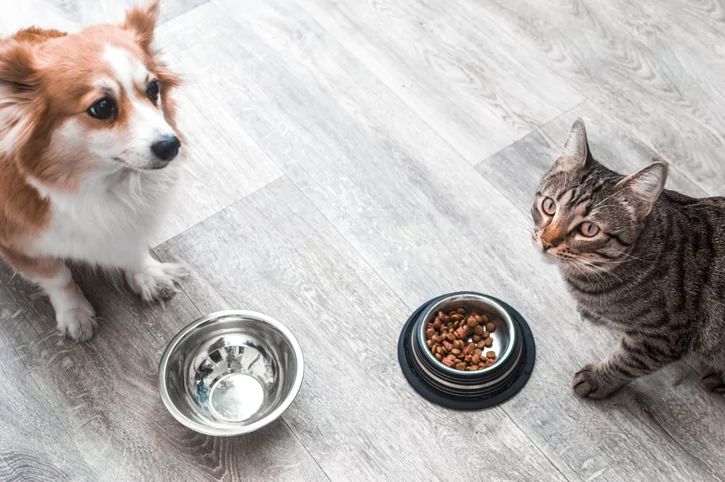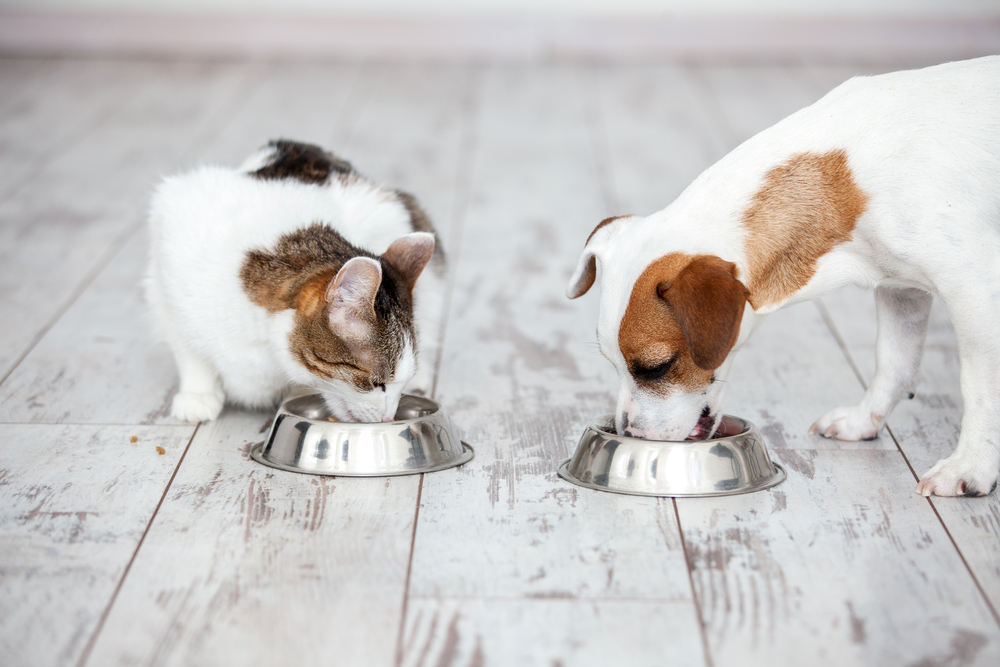Have you ever caught your dog sneaking bites from the cat’s bowl? You’re not alone.
Many pet owners wonder if it’s okay for dogs to eat cat food. It’s a common concern, and it’s important to know the facts. You want the best for your furry friend, and making sure they’re eating the right food is part of that.
This blog will uncover the mysteries of whether cat food is safe for your dog and what you need to know to keep them healthy. Keep reading to discover the surprising truths that could change how you feed your pets forever.
Nutritional Differences
Dogs and cats have different dietary needs. Cat food usually contains more protein and fat. This might not be ideal for dogs. Feeding your dog cat food occasionally might be okay, but it’s not recommended for regular meals. Always consult your veterinarian for the best advice.
Feeding your dog cat food occasionally might not seem like a big deal. However, understanding the nutritional differences between dog and cat food is crucial. Let’s break down some of these differences to help you make informed decisions.Protein And Fat Content
Cats are obligate carnivores, which means they need a lot more protein and fat in their diet compared to dogs. Cat food is formulated with higher levels of these nutrients to meet their specific needs. While dogs are omnivores and can thrive on a more varied diet, a steady diet of cat food could lead to weight gain and other health issues in your dog. I once found my dog munching on leftover cat food and thought nothing of it. But after noticing her gaining weight, I realized the impact of those extra calories. Have you noticed your dog sneaking cat food? It’s worth keeping an eye on their weight and overall health.Vitamins And Minerals
Cat food is rich in taurine, an essential amino acid that cats cannot produce on their own. Dogs, however, can synthesize taurine naturally, so they don’t need as much from their diet. Feeding your dog cat food can lead to an imbalance in other essential vitamins and minerals that are carefully balanced in dog food. Imagine your dog missing out on important nutrients like vitamin E or zinc, which are crucial for a shiny coat and healthy immune system. Ensuring your dog gets the right nutrients is key to their well-being. Have you checked the nutrient content of your dog’s food lately? It might be time to compare it with what’s in cat food. Understanding these differences is vital to keeping your pet healthy and happy. Your dog’s dietary needs are unique, and their food should reflect that.
Credit: bottletreeanimalhospital.com
Health Implications
Many pet owners face the dilemma of dogs eating cat food. It’s crucial to understand the health implications of this behavior. Dogs and cats have different nutritional needs. Feeding dog cat food can lead to various health issues. This section explores the potential digestive problems and long-term effects.
Digestive Issues
Cat food often contains higher protein levels than dog food. This can upset your dog’s stomach. Dogs may experience diarrhea or vomiting. They might also have a reduced appetite. Cat food is rich in fats and oils. This can lead to pancreatitis in dogs. Watch out for signs of discomfort after eating cat food.
Long-term Effects
Regular consumption of cat food by dogs can cause health problems. High protein levels may strain the dog’s kidneys over time. Dogs may develop obesity due to excess calories and fats. Cat food lacks certain nutrients dogs need. This deficiency can weaken your dog’s immune system. It may impact their overall health. Ensuring your dog eats the right food is essential for their longevity.
Behavioral Factors
Understanding the behavioral factors is crucial in determining if dogs can eat cat food. Dogs and cats have different dietary needs. Their behaviors around food differ too. These differences can affect how they perceive and consume cat food. Let’s explore these behavioral factors more closely.
Taste Preferences
Dogs and cats have distinct taste preferences. Cats often prefer strong flavors and high protein content. This might attract some dogs to cat food. Dogs usually enjoy a variety of flavors. Cat food’s rich taste can seem like a treat to them. But, this doesn’t mean it’s suitable for their diet.
Feeding Habits
Feeding habits in dogs and cats are not the same. Dogs usually eat in larger quantities. They might finish their meal in one sitting. Cats often nibble throughout the day. This difference can lead dogs to overeat cat food. Overeating can cause digestive issues in dogs. Observing these habits helps in managing their diet better.

Credit: www.usatoday.com
Safe Alternatives
Dogs may nibble on cat food, but it’s not ideal for their health. Cat food lacks essential nutrients dogs need. Opt for dog-specific meals to ensure they get the right balance of vitamins and minerals.
When considering a dog’s diet, cat food often seems tempting. Dogs may enjoy the taste, but it’s not ideal for them. Cat food lacks essential nutrients that dogs need. Providing safe alternatives ensures your dog stays healthy. These options cater to their dietary needs without compromising on flavor.Dog-friendly Options
Dog food brands offer flavors akin to cat food. These options contain nutrients suited for dogs. Choosing high-quality dog food keeps them healthy. Brands with real meat and vegetables are ideal. They balance taste with nutrition. Always check labels for ingredients. Some dog foods have added vitamins and minerals. These support bone health and energy levels. A variety of flavors can prevent boredom.Homemade Solutions
Creating meals at home is another option. Use lean meats like chicken or turkey. Add cooked vegetables for fiber and vitamins. Brown rice provides carbohydrates and energy. Ensure protein sources are cooked well. Avoid spices and seasonings harmful to dogs. Homemade meals can be tailored to your dog’s taste. Always consult a vet for balanced recipes. Regularly change the ingredients to maintain interest. Homemade meals can be both nutritious and delicious.Consulting A Veterinarian
Feeding your dog cat food can raise many questions. It’s crucial to get expert advice. A veterinarian can provide clarity. They understand animal nutrition. Their insights are valuable. Consulting a veterinarian ensures your pet’s health is prioritized. This step is essential for your dog’s well-being.
When To Seek Advice
Seek advice if your dog regularly eats cat food. This might lead to health issues. Also, if your dog shows any unusual symptoms. Vomiting or diarrhea are common signs. Sudden changes in weight need professional attention. A veterinarian can guide you on next steps. It’s better to be safe. Early consultation prevents bigger problems.
Questions To Ask
Prepare questions before your visit. Ask about nutritional differences between cat and dog food. Inquire about potential health risks. Check if occasional cat food is harmful. Discuss specific dietary needs for your dog. Learn about balanced diets. Your veterinarian can suggest better food options. Gather as much information as possible.
Preventing Food Mix-ups
Dogs and cats have different dietary needs. Feeding them the right food ensures their health. Accidental food mix-ups can happen. This can lead to health issues for your pets. Preventing these mix-ups is important for their well-being. You can take simple steps to keep your pets safe and healthy.
Storage Solutions
Store your pet food in separate containers. Use airtight containers to keep food fresh. Label each container clearly. This helps in easy identification. Place dog food and cat food in different areas. Keep them out of each other’s reach. This reduces the chance of mix-ups. Invest in stackable bins for more space. It keeps your pantry organized.
Feeding Schedule Tips
Establish a consistent feeding schedule for your pets. Feed them at the same time daily. This helps in managing their diet. It also reduces the chance of mix-ups. Supervise their mealtime to ensure they eat their own food. Separate feeding areas for each pet can help. It allows them to eat without distractions. Train your pets to eat in their designated spots. This minimizes confusion and keeps feeding times orderly.

Credit: www.esporte.niteroi.rj.gov.br
Frequently Asked Questions
What Happens If My Dog Eats Cat Food?
Dog eating cat food occasionally isn’t harmful. Regular consumption can cause nutritional imbalance, obesity, or digestive issues. Cat food lacks necessary dog nutrients. Monitor your dog for any adverse reactions and consult a vet if symptoms like vomiting or diarrhea occur.
Ensure your dog has access to appropriate canine food.
What Cat Food Is Safe For Dogs?
Dogs can occasionally eat cat food, but it’s not recommended. Ensure the cat food is free from harmful ingredients like garlic and onions. Always consult your vet before offering cat food to dogs, as their nutritional needs differ. Regular dog food is the best option for your pet’s health.
What Happens If Cat Food Is Given To A Dog?
Feeding cat food to a dog can cause digestive issues and nutritional imbalances. Cats need more protein and taurine than dogs. Long-term consumption may lead to obesity, pancreatitis, or kidney problems in dogs. Always choose dog-specific food for a balanced diet tailored to their needs.
Is Cat Food Safe For My Dog?
Cat food isn’t toxic, but it’s not ideal for dogs. It’s high in protein and fat, which can upset a dog’s digestive system. Occasionally, a small amount is usually fine, but it’s best to stick to dog food for a balanced diet.
Conclusion
Feeding your dog cat food sometimes is not ideal. Dogs need their own balanced diet. Cat food lacks certain nutrients dogs need. It has high protein levels, which can harm dogs over time. Always choose dog-specific food for your furry friend.
Consult your vet for dietary advice. They can guide you on the best nutrition. Keep your dog’s health a priority. A happy, healthy dog equals a happy owner. Make informed choices for their meals.
